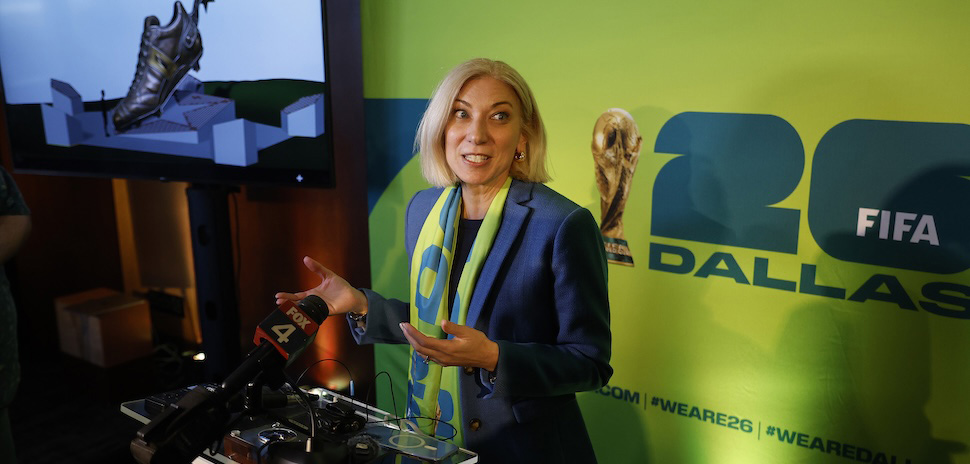UT Dallas and SMU are teaming up with RevTech, a retail technology venture capital firm based in Dallas, on a challenge grant for solutions aimed at a new “safe normal” on higher-ed campuses. RevTech will award $5,000 grants to students with the best ideas for virus suppression at universities and colleges.
The partners are looking for the ideas with the potential to make the biggest difference in creating a low-risk campus environment that could exist after state and local executive orders related to the COVID-19 pandemic have expired, according to a statement.
This latest grant offering — called the SAFE Schools Suppression Alternatives for Education Grant—is an extension of RevTech’s existing social impact grant program that’s “dedicated to entrepreneurial solutions that address the needs of vulnerable Dallas populations affected by the COVID-19 pandemic,” RevTech said.
That program, announced in March, had “an influx of interest,” RevTech said. Now the VC firm has “doubled down” on its financial commitment to further the social impact potential of its grants. The new program is open to current UTD and SMU students.
RevTech wants to amplify the Dallas community impact of the funding, it said. For the new higher ed industry-targeted grants, RevTech is looking for a “10x return” within 90 days in terms of Dallas community support. But with the rapid timeline of the grants, RevTech notes, a minimum of 3x value of community support may be considered.
READ NEXT: RevTech Awards $40,000 in Impact Grants to 8 Dallas-Area Startups and Nonprofits
”The safety and well-being of our students, faculty, and staff is our highest priority in an unprecedented moment like the present,” said Steve Guengerich, who leads the innovation and commercialization programs at UT Dallas.
In its role as a tier-one research university and top-ranked entrepreneurship program, UT Dallas feels compelled to seek innovative solutions, he said.
According to Guengerich, the idea for a higher-ed focused SAFE School challenge—spawned at UT Dallas—quickly led to a partnership with SMU and RevTech. A proposal to UT Dallas VP of Research, Joe Pancrazio, as well as SMU innovation and entrepreneurship peers Duncan Macfarlane and Simon Mak, brought it life. RevTech provided funding and grant support.
The problem to solve in this challenge is: “What is a minimally viable product combination of technology and process that will permit safe, confident social interaction and retail commerce?” per the application.
Through the challenge, UT Dallas hopes to facilitate “returning to a ‘safe normal’ as soon as possible so that our students and researchers can enjoy the full value and richness of interaction that a campus environment provides.” Guengerich said.
SMU’s Jennifer Ebinger, director of the Incubator@SMU, sees the contest partnership with UT Dallas and RevTech Ventures as a great way to imagine new technologies to improve the safety and security of student interaction with retail services on campus.
It’s “a terrific opportunity to synergize the talent and creativity of our Dallas community and create solutions that are valuable to all schools and universities in North Texas,” she said.
Representative sponsors of the challenge grant at SMU are the Caruth Institute for Entrepreneurship; the Hart Center for Technology, Innovation and Entrepreneurship; and the Incubator@SMU powered by the Provost’s Office of Engaged Learning, according to a statement.
The two universities will work together to co-promote the higher-ed challenge.
Effective, accountable, and legitimate solutions
RevTech is looking for solutions that are measurable. So just what does that look like?
RevTech asks students to create their own measuring stick, citing examples such as:
-
- Mobile apps and services that track food preparation, mobile (e.g. QR code) check-ins at retail (book store), hospitality (dining hall, food court, pub), and other public spacesResourcefulness
- Manual or automated reporting processes that track individual health, movement, social interactions, location
- Widely available hand wipes, tissues, other surface cleaning agents
- Nearly universal face masks and accurate skin thermometers
- Various kind of social distance barriers and signage—inside facilities and in key, outside areas around campus, to control/track access flow (library, research labs, event halls, etc.)
The challenge adopts Peter Frumkin’s approach of strategic giving, according to the application. That means solutions should adopt parameters of effectiveness, accountability, and legitimacy.
Startups can team with students
While the grants have to be student-led by either SMU or UTD students, startups can team with a student group, said Guengerich.
The grants are led by students because “they are the subject matter experts—i.e., they live on campus, attend class, eat the dining hall, study at the library, etc.,” Guengerich told Dallas Innovates via email. “But, that doesn’t mean that they can’t combine their student knowledge of UTD or SMU with a technology idea, a service, or some other kind of product to adapt it.”
If folks in the Dallas-Fort Worth startup community think they can provide a solution for higher-ed campus safety in the time of COVID-19, they will need student collaborators to help validate the idea for a venture that can pivot to a campus use-case, he said. To explore a match up with a student team, contact SMU or UT Dallas.
Apply by April 30
Submissions will be evaluated based on resourcefulness, creativity, simplicity, speed-to-market, team strength, and the impact to the on-campus environment, according to the application. Interested SMU and UTD students can apply here.
![]()
Get on the list.
Dallas Innovates, every day.
Sign up to keep your eye on what’s new and next in Dallas-Fort Worth, every day.

![From left, University of Texas at Dallas and SMU. [Photos: UTD, Andrew Smith; SMU, courtesy]](https://s24806.pcdn.co/wp-content/uploads/2020/04/RevTech-UTD-SMU-970.jpg)




























